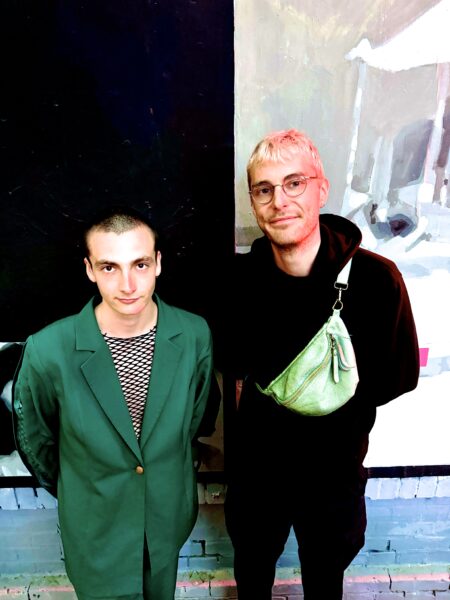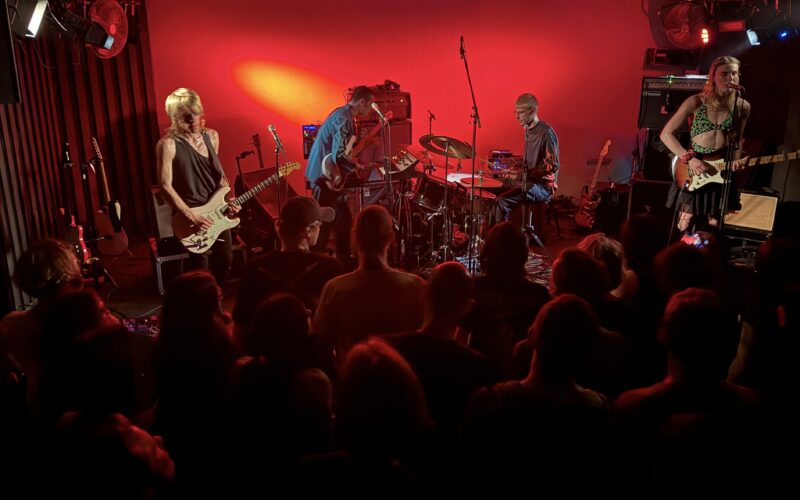The four-piece band started playing together in 2015. With all the members coming from music conservatories they quickly noticed that they needed to “break away from the constraints” they were taught at school. Touring, improvisation, and continued politicization played a big role in turning their concerts and music into spaces of conversation and community. Especially in the context of genocide happening in Palestine supported by weapon deliveries and suppression of critical voices in Europe, political engagement on the stage is important. In the spirit of their band name – “putting into words what mental illness is and how it is perceived in society” – The Psychotic Monks create cathartic music that opens space for important conversations from mental health to Palestine and trans* rights.
Your music is based on improvisation. Since starting out in 2015, the four of you seem to have found a mutual musical understanding of one another. Do you have rules for your improvs and how do you manage the democratic or anarchic process where everyone holds space without disturbing the others?
Paul: The rules we have are to try to give space when someone has an idea, and we to try to follow it through. We wanted to start the group truly horizontally, with everyone participating in common decisions. Then we realized it was complicated. Now we have enough trust to allow each other to manage the areas they are most comfortable in. We realized that in the democratic process, things can be uneven if someone does not agree but the other three do.
Clément: The process is neither anarchic nor democratic because it’s the minority that we try to listen to most. If it doesn’t fit one person, we don’t do it and instead look for a solution that makes everyone happy. We realized that we have to rely on our different experiences so that each one of us holds the right place. Above all, we tell ourselves that it is never done. Since it’s a jam, it is always surprising and, of course, there are times when it doesn’t work. Giving space is the most important thing.
Is music inherently political?
Paul: I would say yes. Just by going on stage, we participate in symbols, we participate in a performance, we have a microphone, and we have the possibility of saying or relaying things. The nuance that I try to convey is that I am a musician, and my area of expertise is music, it is not geopolitical issues, but on the other hand, I have my sensitivity and my commitments. And I find that music creates gathering spaces and communities; it’s obviously a function of the people who come together, and the ideas that are shared, that create a political whole.
Clément: What the four of us discovered about listening to the minority in our band, we apply to our politics. If we are going to be on stage, it might as well serve the people who get less heard and who have less space. Since we come from places that are more privileged, this is even more important to do. The goal is to try to speak, relay ideas, and give a voice too.
Against the Status Quo
How are you managing your mental health on tour, especially going through Germany, where the political climate is quite Zionist?
Clément: That’s a question we asked ourselves too. We wondered if we might get canceled here, but chose to take a stance and say our message out loud. Besides the tour / mental health relation in the current context, there is the collective work and our personal lives. We are careful and set limits as we told ourselves that we would cancel this tour if needed. Each member of the band has their moment and we’ve canceled dates before because things weren’t going well – and that’s normal. In 2019 we came out of intensive touring physically and psychologically tired. I think the hardest part is knowing that if you cancel, people who are paid for the tour, who are with us on the road, are also affected.
Paul: If we were in other jobs, we might have requested breaks when we were psychologically incapacitated. Now, we try to be as vigilant as possible and find out where we are going to play. As long as nobody prevents us from playing, conveying our opinions, and representing ideas, it is fine.
Is your music a threat to the status quo, a healing process, an escape?

Photo by Rainer Scheerer
Paul: Healing process! We talk about it a lot between us, it’s a cathartic emotional release. Being on stage allows us to let go and take the audience with us. We are not all alone, many of us feel ups and downs, who want to organize, and who are not sure how it’s done.
Clément: In the current context, in France in particular, we have become accustomed to the heavy atmosphere. Touring is almost a breath of fresh air compared to when we are in France. We say France, but Germany is also complicated in regard to Palestine. The more people speak up, the more afraid the status quo becomes. We have reached a standoff between two opposite sides.
Paul: It’s scary. I try to tell myself that it’s okay to be afraid. And then, once again, I feel that we must pay particular attention to the folks who would be on the front line facing racist, fascist, colonial policies… And for us, not to bury our heads in the sand because it doesn’t hit us right away.
Changing a Space
You have a code of conduct on your Instagram, do you think it has been well received by your fans, promoters, and concert venues?
Clément: The way we unloaded on stage in 2019, earned us feedback such as “It’s violent, it’s chaos, it’s a slap in the face”. So, we tried to get a little closer to our ethos of positioning ourselves against violence with the last album. When there was the scandal of Nahel, the youth who was killed by the police, we spoke up about it. Artie’s trans* identity also “disturbed” some people. If you leave, it’s because we don’t agree. Our code of conduct definitely filtered out some people.
Paul: But, this helped create a community: there were people who walked away and people who joined us. Becoming a little more politicized was a gateway for some people to say “I belong here”.
“There was fundamental work done that changed the atmosphere during our concerts. Like that, we came to realize that we can change a space. Artie was able to speak about her trans* identity and we also invited people to talk about Palestine.” – Clément
How do you view gender issues in the current context of the rise of fascism?
Paul: Taking into account the fascist threat of the recent vote in France, we need to stand together. We must consider how to mobilize and interest people who are not aware of gender issues. As the far-right rises, it is all the more urgent to reconnect with our neighbors, to promote this ideal of tolerance and share our knowledge. There is a lot of misinformation about gender, it is crucial we defend ourselves from the false opinions presented in the mainstream media; it’s a subject that terrifies people in France. And in fact it is also a business today to move towards hatred. I continue to encourage questions and “Protect trans* kids”. We need to show strong solidarity, especially in the current climate. I feel the system tends to set communities against each other. It’s the game of the powerful and the patriarchy to stay on top.
Clément: These people need to be invited to speak. Every time we talk about trans* people, especially in France, it’s not trans* people who talk about their experience, it’s people who project, it’s never the people concerned who come forward – same with debates about racism, especially in the mainstream media. The population need to educate themselves and take a step towards the other, we all need to realize the privileges that we have and the bias we hold in our mind.
A message from the Psychotic Monks to the public?
Paul: It’s essential to avoid exclusion as much as possible and to understand the reality of others if we want to live together. It is terrifying our rights are directly threatened by the popularity of the far-right, who co-opt people who want legitimate change but no longer know where to find it. Let’s make no mistake about who our enemies are, we need to talk to each other and reverse the trend. Let us continue popular unity and leave no ground for fascists to sow ideas of intolerance.
Clement: Take care of yourself.
Paul: Be offended. Keep building communities and asking questions, and talking to each other and trusting each other. Let go too, because we are at a time when everyone is exhausted at work and with everything else… And we are lucky enough to have a job that allows us to earn a living by making music. So, I want to be part of this circle of energy transmission and questioning.
Paul & Clément: And Palestine!
Paul: I think it’s the crystallisation of many struggles against colonialism, against patriarchy, against racism.
Clément: And we do things on our own scale.
Paul: We meet people who impact us and who disseminate these same messages. Sometimes I lose my energy, but I see other folks who continue to fight and who continue to give energy… let’s be a chain of positive energy.
Listen to “The Colour Pink” out via FatCat Records. You can stay in touch with The Psychotic Monks via their Instagram.



